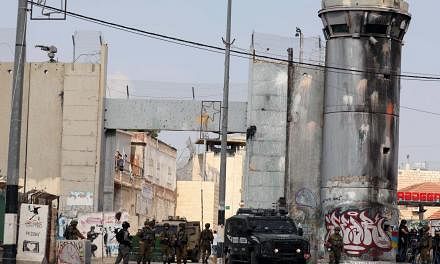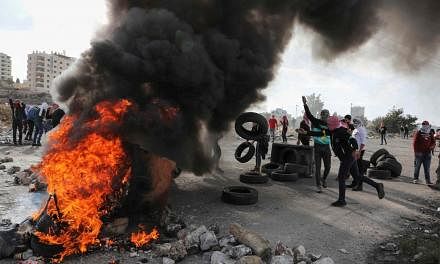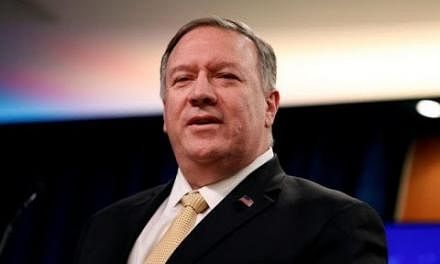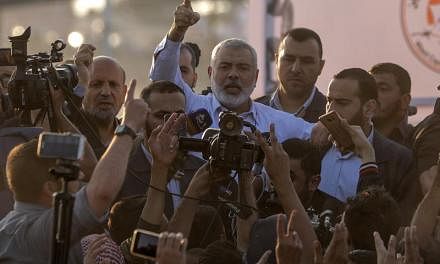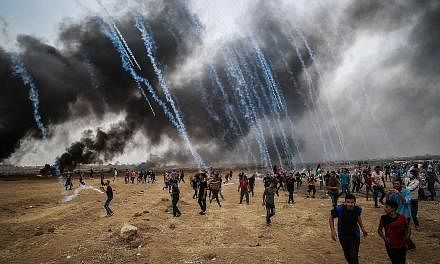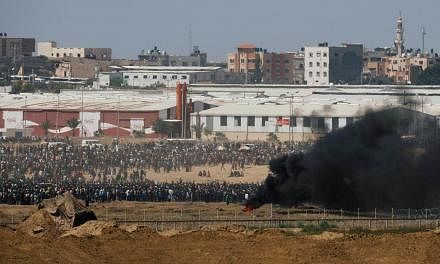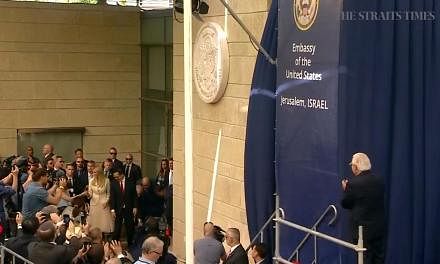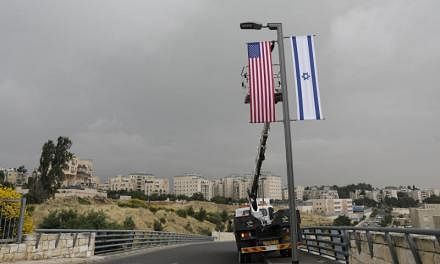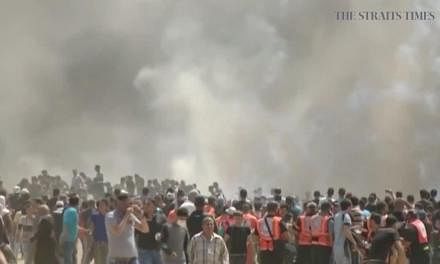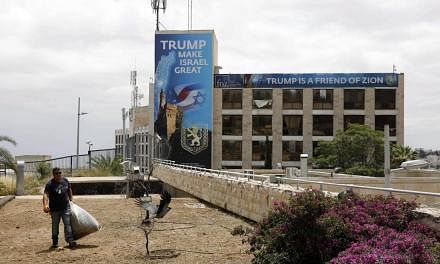TEL AVIV - In their reaction to the speech of US President Donald Trump recognising Jerusalem as Israel's capital, Israelis and Palestinians stuck to their respective narratives.
One side interpreted it as unfettered support, while the other lamented it and uttered threats. Both are in for a surprise once they appraise the full content of a carefully crafted presidential speech.
In Jerusalem, where Israeli politicians struggled to out-thank one another in Twitter posts to the US President, the authorities illuminated the medieval city walls with the American and Israeli flags as a sign of deep felt gratitude for his "historic decision".
The Palestinians had a festival of lights of sorts, too, setting American flags and effigies of Mr Trump ablaze in protest. Here, politicians competed in disparaging the White House and making dark predictions.
In Ramallah, the anger and sense of insult were almost palpable. Dr Mahmoud Abbas, President of the Palestinian Authority, declared in a brief televised speech that the United States had disqualified itself as a mediator in negotiations with Israel.
"These condemned and unacceptable measures are a deliberate undermining of all efforts exerted to achieve peace and represent a declaration of the United States' withdrawal from undertaking the role it has played over the past decades in sponsoring the peace process," he said.
He lambasted Mr Trump for taking decisions that "reward Israel for denying agreements and defying international law, and encourage it to continue its policy of occupation, settlements, apartheid and ethnic cleansing".
Palestinian chief negotiator Saeb Erekat defined the speech as "the most dangerous decision that any US president has ever taken".
Relocating the US embassy from Tel Aviv to Jerusalem was "prejudging, dictating and closing doors for negotiations".
Ultimately, he was "pushing this region towards chaos (and) violence", Mr Erekat told the satellite channel Al Jazeera.
Since now it was "meaningless" to erect a Palestinian state without Jerusalem as its capital, his people were left only one option: "To fight for equal rights" in a single state between the Jordan River and the Mediterranean, he claimed.
The radical-Islamist Hamas movement, which controls the Gaza strip, claimed that Mr Trump had "opened the gates to hell".
"Recognising Jerusalem as Israel's capital is an aggression against all Arab and Muslim states, and against free people all over the world," said one of its leaders Izat al Rasheq.
He swore that Israel would one day disappear, and "Jerusalem will remain the capital of Palestine, the Arabs and Muslims".
The still more radical Palestinian Islamic Jihad even opined that Mr Trump had declared war on the Palestinian people.
Still, there was no violence on Wednesday (Dec 6). This may have been due to a storm whose pounding rain drove potential stone throwers indoors.
More importantly, while Dr Abbas did fan the flames, he has no interest in severe violence that could ultimately destabilise the PA and threaten his rule.
Hamas, too, is keener on rebuilding Gaza and cementing its grip on the strip than on risking another war with Israel.
Fatah Central Committee member Nasser al-Qudwa, while calling for "participation in different expressions of anger", made a point of demanding protests remain "non-violent" and "unarmed".
That does not preclude clashes on Friday, when tens of thousands of Muslims leave Friday prayers. In fact, that is what Hamas is intending to happen. But the PA has so far only called for general strikes and demonstrations, which occurred in several cities in Gaza, the West Bank and the Arab world, predominantly in front of US institutions.
In contrast, Israeli politicians outpraised one another in Twitter posts of thanks for Mr Trump.
Prime Minister Benjamin Netanyahu spoke of a "genuine milestone in the glorious history" in spite of Jerusalem's "3,000-year-old" past.
Naftali Bennett, Minister of Education and leader of the settler party Jewish Home, congratulated Mr Trump on "making history" and called "upon the rest of the world to follow".
The Czech Republic took this call to heart: By evening, it became the first EU member state to recognise West Jerusalem as Israel's capital.
It was left to Issawi Frej, a backbencher from the left opposition party Meretz, to offer the most dispassionate and accurate analysis of Mr Trump's speech: Nothing much has occurred, he opined.
Mr Trump had announced the relocation with fanfare - while silently signing yet another deferral of its execution. He could have simply changed the status of the existing US consulate in Jerusalem. Instead, he solely directed the State Department to "begin preparation to move the American embassy from Tel Aviv to Jerusalem".
While it would "immediately begin the process of hiring architects, engineers and planners", this is a process bound to take years - more than enough time to restart negotiations for agreeing on a two-state solution, which Mr Trump endorsed for the first time since taking office.
There were more elements in his speech that should have upset the Israelis and delighted the Palestinians. Mr Trump stated that his recognition was only "acknowledging the obvious. That Jerusalem is Israel's capital. This is nothing more or less than a recognition of reality".
Still, he stressed that he was aiming for "an agreement that is a great deal for the Israelis and a great deal for the Palestinians".
As opposed to interpretations offered in the Middle East, the President insisted that he is "not taking a position of any final status issues including the specific boundaries of the Israeli sovereignty in Jerusalem or the resolution of contested borders. Those questions are up to the parties involved".
By speaking of boundaries of Israel in Jerusalem, Mr Trump was actually implying dividing the city. For listeners who missed this fine point, the president reiterated that he would support a "solution if agreed to by both sides" - granting the Palestinians a right to veto any solution to the Jerusalem issue not to their liking.
On Wednesday evening, Israelis and Palestinian preferred to ignore these subtleties and dedicate themselves to their respective narratives.
It may be up to Vice-President Mike Pence, who is about to visit the region soon, to clear up the finer points of Mr Trump's speech, and their far-reaching potential repercussions.


